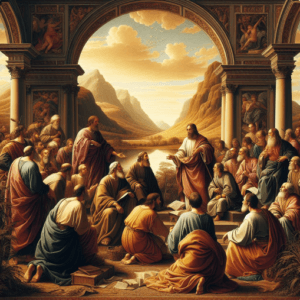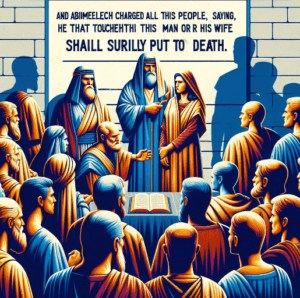ISAAC MISREPRESENTS REBEKAH
The pressure of famine in Canaan forced Isaac with his family and flocks to migrate into the land of the Philistines, where he was exposed to personal danger, as his father had been on account of his wife‘s beauty; but through the seasonable interposition of Providence, he was preserved (Psalm 105:14, Psalm 105:15).
Isaac settles his large household in Gerar, in obedience to the Lord. When some locals ask about Isaac’s beautiful wife Rebekah, he immediately follows in his father’s footsteps and tells them she is his sister. He is afraid they will kill him to take her from him.
The same failure Abraham made—twice—Isaac now makes in his own life. The lie is revealed when King Abimelech himself catches the couple being intimate. He is furious because Isaac’s lie could have brought guilt about the kingdom, just as Abraham’s had done.
Still, the king decrees that anyone who harms Isaac or Rebekah will be killed. God demonstrates that He will protect Isaac as He did Abraham, fearful and faithless or not (Genesis 26:6–11).
Genesis 26:6-11 KJV
[6] And Isaac dwelt in Gerar:
[7] And the men of the place asked him of his wife; and he said, She is my sister: for he feared to say, She is my wife; lest, said he, the men of the place should kill me for Rebekah; because she was fair to look upon.
[8] And it came to pass, when he had been there a long time, that Abimelech king of the Philistines looked out at a window, and saw, and, behold, Isaac was sporting with Rebekah his wife.
[9] And Abimelech called Isaac, and said, Behold, of a surety she is thy wife: and how saidst thou, She is my sister? And Isaac said unto him, Because I said, Lest I die for her.
[10] And Abimelech said, What is this thou hast done unto us? one of the people might lightly have lien with thy wife, and thou shouldest have brought guiltiness upon us.
[11] And Abimelech charged all his people, saying, He that toucheth this man or his wife shall surely be put to death.
Genesis 26:6 KJV
And Isaac dwelt in Gerar:
 Gerar is to the south. Abraham and Isaac both lived in the southern part of that land. Actually, Abraham had come into the land up north to Shechem, but he ended up living down in the southern part at Hebron, the “place of communion.”
Gerar is to the south. Abraham and Isaac both lived in the southern part of that land. Actually, Abraham had come into the land up north to Shechem, but he ended up living down in the southern part at Hebron, the “place of communion.”
Isaac obeyed God’s command to stay in Gerar and not to go to Egypt to seek relief from the famine. This statement of simple obedience follows the previous verse in which the Lord told Isaac that He had sworn to bless Abraham because of his obedience.
Abraham obeyed God when commanded to move to a new region (Genesis 12:1–3). Now Isaac repeats the pattern and obeys, as well (Genesis 26:1–5).
Genesis 26:7 KJV
And the men of the place asked him of his wife; and he said, She is my sister: for he feared to say, She is my wife; lest, said he, the men of the place should kill me for Rebekah; because she was fair to look upon.
 Isaac is repeating the sin of his father. God had warned him not to go to Egypt; so he didn’t go there but went to Gerar instead. In Gerar he must have seen the men casting glances toward Rebekah; so he says to her, “You tell them that you’re my sister, not my wife.”
Isaac is repeating the sin of his father. God had warned him not to go to Egypt; so he didn’t go there but went to Gerar instead. In Gerar he must have seen the men casting glances toward Rebekah; so he says to her, “You tell them that you’re my sister, not my wife.”
The difference between Abraham and Isaac is that Abraham told half a lie and Isaac told a whole lie. The one he is telling was cut out of the whole cloth. Isaac is walking in Abraham’s footsteps, seemingly for better or worse.
Like Abraham, he obeyed the Lord by settling down in Gerar (Genesis 26:1–5). Like Abraham, he will interact with a king named Abimelech, in the land of the Philistines (Genesis 22:21–24).
And now, like Abraham, he will lie about his beautiful wife being his sister out of fear of someone killing him to take her. This scenario is slightly different than what Abraham did with Sarah in Egypt (Genesis 12:10–20) and then later in Gerar (Genesis 20:1–18).
For one thing, Abraham seemed to have planned further ahead, asking Sarah to participate in his lie before telling it to others. Second, Abraham’s wife Sarah was, technically, his half-sister, giving the lie the sheen of truthfulness.
This verse reads almost as if Isaac spewed it out in the heat of the moment in response to some men asking about his wife. He may have had actual cause to be concerned about his safety. In his case, though, Rebekah was not by any measure his sister (Genesis 22:20–23).
Interestingly, neither Abraham nor Isaac are condemned for their action in the text itself—in fact, God protects them both, along with their wives. This is challenging, since the lie seems especially unloving and weak.
Worse, it comes immediately following God’s promise in the previous verses to be with Isaac and to bless him.
Was this strategy, handed down from father to son, a demonstration of a lack of faith in God?
God has reiterated His blessings so that Isaac knows they apply to him, personally (Genesis 26:3–4). Perhaps God is allowing Isaac to learn that his trust in God must be personal, as well.
Genesis 26:8 KJV
And it came to pass, when he had been there a long time, that Abimelech king of the Philistines looked out at a window, and saw, and, behold, Isaac was sporting with Rebekah his wife.
 I guess they were laughing and playing together. There is nothing in Isaac’s denial of his wife to be imitated, nor even excused. The temptation of Isaac is the same as that which overcame his father, and that in two instances.
I guess they were laughing and playing together. There is nothing in Isaac’s denial of his wife to be imitated, nor even excused. The temptation of Isaac is the same as that which overcame his father, and that in two instances.
This rendered his conduct the greater sin. The falls of those who are gone before us are so many rocks on which others have split; and the recording of them is like placing buoys to save future mariners.
Isaac has followed his father’s example. Both had beautiful wives. In two separate instances, Abraham feared that Sarah’s beauty would lead someone to kill him to get her. So, he asked her to lie for him and say she was his sister (Genesis 12:10–20; 20:1–18).
In both of those cases, the lie backfired. Both times, a local ruler believed their story and took Sarah for a wife. And in both cases, God brought judgement on the household of the ruler in order to protect and deliver Sarah.
In Isaac’s case, it seems, a long time passed without anyone making a play for Rebekah. Perhaps the couple forgot to continue to pretend to be siblings or perhaps Abimelech had an unusually good vantage point for observing them.
In any case, he saw Isaac and Rebekah acting in a manner which convinced him, absolutely, that they were married. The Hebrew term used here is based on the word tsachaq, which can mean “laughing” or “sporting” or “caressing,” depending on the translation.
In other words, they were involved in some type of intimate activity which would not be normal for siblings. As the next verse reveals, that was all Abimelech needed to see to understand that Isaac had lied about his wife.
Genesis 26:9 KJV
And Abimelech called Isaac, and said, Behold, of a surety she is thy wife: and how saidst thou, She is my sister? And Isaac said unto him, Because I said, Lest I die for her.
 When confronted by Abimelech about his lie that Rebekah was his sister, Isaac tells the truth about his fear: he didn’t want to die because of his wife.
When confronted by Abimelech about his lie that Rebekah was his sister, Isaac tells the truth about his fear: he didn’t want to die because of his wife.
As was the case when Abraham did the same thing (Genesis 12:11–13), it’s hard to feel respect for a man who would do such a thing to his spouse. Even the pagan king is angered at this deception, even though nobody has suffered for it, yet.
This might be a lingering lesson from the earlier incident with Abraham, where a prior king, also called Abimelech (Genesis 20:2), was faced with consequences when he nearly violated Sarah’s marriage to Abraham (Genesis 20:3–6).
Despite his fear and faithlessness, God will provide protection for Isaac, no matter how untrusting he appears to be.
Genesis 26:10 KJV
And Abimelech said, What is this thou hast done unto us? one of the people might lightly have lien with thy wife, and thou shouldest have brought guiltiness upon us.
 Isaac had put these people in danger of committing a sin. In the prior verses, Isaac repeated one of his father’s failures by lying about his wife, to protect his own life (Genesis 20:2–6). Abimelech’s accusation in this verse is absolutely right.
Isaac had put these people in danger of committing a sin. In the prior verses, Isaac repeated one of his father’s failures by lying about his wife, to protect his own life (Genesis 20:2–6). Abimelech’s accusation in this verse is absolutely right.
Isaac failed to face the possibility of protecting himself, or his wife, from someone who might try to take her from him. This cowardice has put Abimelech’s whole kingdom at risk of violating a marriage—something even a pagan nation of that era apparently considered a grievous mistake.
While it’s all but certain this is not the exact same Abimelech who dealt with Abraham—in a very similar situation in Genesis 20—this king most likely knows that story.
At that time, the Lord came to Abimelech in a dream and called him a dead man for innocently taking Sarah to be his wife because of Abraham’s lie.
This Abimelech is aware of the great guilt that would have fallen on him and/or his people if one of them had done the same with Rebekah. His anger is justified.
Again, Isaac’s failure to trust God has led to grave danger for those near him. He, however, continues to be protected by God’s promise to be with him, as the following verse will make clear.
Genesis 26:11 KJV
And Abimelech charged all his people, saying, He that toucheth this man or his wife shall surely be put to death.
 Abimelech became a very good friend of Isaac’s. Isaac had the respect of the community just as Abraham had had. Both of them were outstanding men. I mention that here because from the rest of the chapter we might not get the impression that Isaac is an outstanding man.
Abimelech became a very good friend of Isaac’s. Isaac had the respect of the community just as Abraham had had. Both of them were outstanding men. I mention that here because from the rest of the chapter we might not get the impression that Isaac is an outstanding man.
This Abimelech was not the same that lived in Abraham’s days, but both acted rightly. The sins of professors shame them before those that are not themselves religious.
Isaac’s plan to protect himself from harm if someone wanted to take his beautiful wife (Genesis 26:5–9) is shown to have put more than just Rebekah at risk. When Abimelech, the king of the region, becomes aware of the lie, he is justifiably angry.
In fact, Abimelech expresses at least a sliver of godly morality, when he stated that the lie could have brought guilt upon him and his kingdom if someone had taken her (Genesis 26:10). Now, though, Abimelech acts to make sure that such a thing does not happen.
If anyone dares to harm either Isaac or Rebekah in any way, he will enact the death penalty. Through Abimelech’s actions, God has shown once again that He is with Isaac and protecting him, even and in spite of Isaac’s apparently fearful and faithless actions.
This seems to be a part of God teaching the same lesson learned by Abraham—that His love and blessings are personal, and apply to Isaac himself (Genesis 26:1–5).
I hope that you have really enjoyed this post,
Please Leave All Comments in the Comment Box Below ↓













The article about Isaac misrepresenting Rebekah as his sister provides an intriguing look at a complex biblical story.
It’s fascinating how this incident reflects the cultural and personal dynamics of the time. This situation raises questions about trust and integrity within relationships.
How do you think Isaac’s actions might have influenced his relationship with Rebekah and their broader context?
I’d love to hear more thoughts on the implications of this story and how it relates to themes of honesty and loyalty in our own lives.
Thanks for shedding light on this intriguing narrative!
Hello Marlinda,
You’ve touched on some really important points! Isaac’s decision to misrepresent Rebekah as his sister indeed highlights complex issues of trust and integrity.
In the broader context of their story, it’s clear that this incident could have significant implications for their relationship and how they are perceived by others.
Isaac’s actions might have introduced a strain in their relationship, as deception often undermines trust. It’s possible that Rebekah felt betrayed or undervalued, which could have created tensions between them. Additionally, this situation reflects the broader cultural norms of the time, where fear and survival often took precedence over personal honesty.
In terms of how this story relates to our own lives, it serves as a powerful reminder of the impact of our actions on our relationships. The themes of honesty and loyalty are timeless, and this narrative challenges us to reflect on how we navigate trust and integrity in our own interactions. It’s a call to consider the long-term effects of our choices and to strive for transparency in our relationships.
Thanks for sparking such a thought-provoking discussion!
Blessings My Friend!
This article truly dives deep into the timeless lessons we can all learn from Isaac’s story.
I love how you connected Isaac’s fear and human frailty to the bigger message of faith and trust in God’s promises.
What are your thoughts on how we can apply this lesson in modern times, where fear often drives people to make questionable choices?
In what ways do you think this story encourages us to lean on our faith instead of giving in to fear when life gets tough?
Also, the parallel between Isaac’s and Abraham’s actions was a powerful point!
Have you considered expanding on how their stories reflect generational habits of fear and faith, and how we can break such cycles in our own lives?
Thanks for sharing such valuable content!
Gabriel John
Hi Gabriel,
Thank you so much for your thoughtful response! I’m glad the article resonated with you. Isaac’s story indeed offers profound insights into managing fear and nurturing faith.
In modern times, fear often pushes us towards hasty or unwise decisions, especially when we’re overwhelmed by uncertainty or adversity. Isaac’s journey reminds us that faith can be a stabilizing force when fear threatens to derail us. By reflecting on his story, we can learn to pause, evaluate our choices through a lens of trust and hope, and seek guidance beyond immediate anxieties.
Regarding the generational aspect, that’s a compelling angle. The parallels between Isaac’s and Abraham’s experiences highlight how patterns of faith and fear can persist through generations. To break these cycles, we need to actively cultivate awareness and intention in our own lives. Recognizing the influence of past patterns is the first step toward making conscious choices that align with our values and beliefs rather than reactive fears.
Thanks again for your insightful questions! I’ll definitely consider exploring these ideas further.
Blessings My Friend!
This was such an insightful take on Isaac and Rebekah’s story!
It’s interesting to see how history repeated itself, with Isaac following in Abraham’s footsteps. I love how you pointed out the humanity in Isaac’s fear, despite God’s promises of protection. It’s a great reminder of how trust in God has to be personal, not just inherited.
Thanks for breaking it all down!
Hello Randi,
Thank you so much for your thoughtful comment!
I completely agree—it’s fascinating how the themes of fear and trust weave through their stories. It really highlights the personal journey of faith that each individual must navigate, even in the shadow of great legacy. I’m glad you found the breakdown helpful!
What aspects of their story resonate with you the most?
This post really highlights the human flaws in both Abraham and Isaac, showing that even those chosen by God can struggle with fear and doubt.
It’s interesting to see how Isaac repeated his father’s mistake, yet God still protected him. The fact that Abimelech showed understanding and took steps to prevent harm is a reminder that God can use anyone to ensure His plans are fulfilled. It’s comforting to know that, despite our imperfections, God’s grace remains constant.
Thank you for sharing this thoughtful reflection on Genesis!
Hello Maksim,
What a profound observation! It’s true that the stories of Abraham and Isaac remind us that our flaws don’t disqualify us from being part of God’s plan.
Their struggles highlight the depth of God’s grace and the ways He can work through anyone, even in our moments of weakness. I appreciate your insight on Abimelech’s role, too—it shows that divine purpose can come through unexpected avenues.
Thank you for engaging with this reflection!
I found your article about Isaac misrepresenting Rebekah really interesting!
It highlights the complexities of relationships in biblical times and raises questions about trust and identity. The fact that Isaac referred to Rebekah as his sister shows how protective instincts can influence our choices, even when they might complicate things.
I’m curious how you think this story reflects broader themes of loyalty and family dynamics.
Do you see any parallels with how we navigate relationships today?
I’d love to hear your thoughts!
Hello John,
Thank you for your thoughtful comment!
I’m glad you found the article engaging. The dynamics between Isaac and Rebekah certainly illustrate the complexities of trust and identity, and it’s fascinating to see how those themes resonate through time.
I think the story does reflect broader themes of loyalty and family dynamics, especially in how we often prioritize protection and reputation over honesty in relationships. Today, we still grapple with similar issues—balancing our loyalty to family with the need for authenticity in our connections.
It’s interesting to consider how societal pressures can shape our choices and identities, just as they did for Isaac and Rebekah.
I’d love to hear your thoughts on specific examples or parallels you see in modern relationships!
Blessings My Friend!